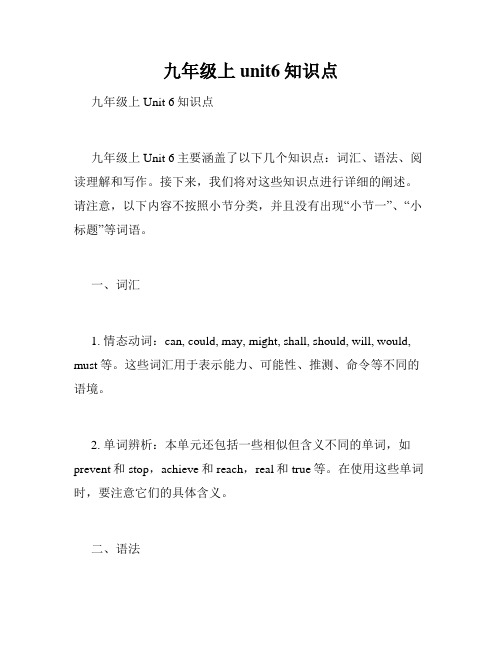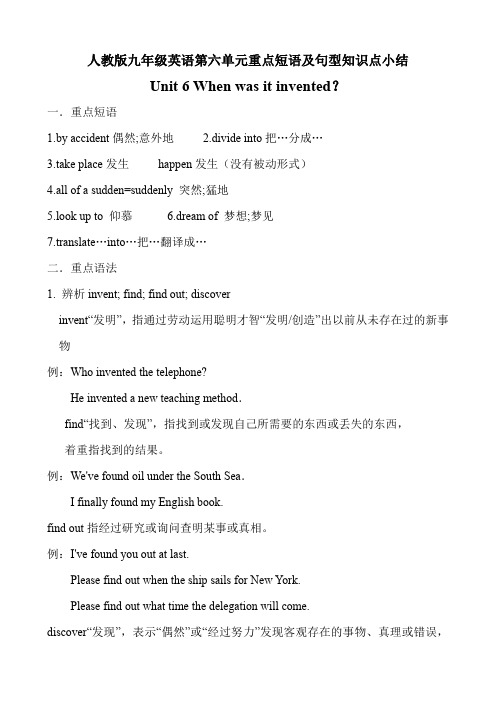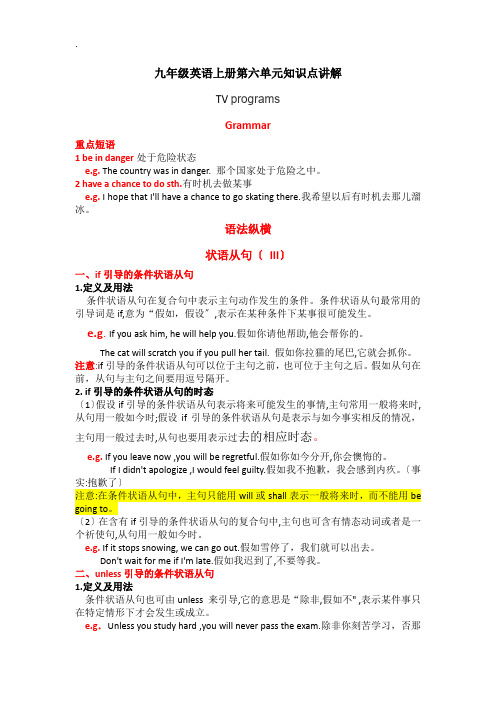九年级英语上册第六单元语法UNIT 6
人教版九年级上册英语unit6知识点

人教版九年级上册英语unit6知识点九年级上册英语Unit6知识点回顾在九年级上册英语中,Unit6是一个重要的单元,主要涉及到时间的表达和询问,并且包括几个重要的语法结构。
本文将对这些知识点进行回顾,并探讨如何运用这些知识点来提高英语水平。
1. 时间的表达在Unit6中,我们学习了几种表示时间的方法。
首先是使用基数词表示具体的日期,例如:July 1st。
另一种方法是使用序数词表示星期几,例如:Monday。
在具体的时间表达上,我们可以使用24小时制,也可以使用12小时制。
例如:9:30表示上午9点30分,而15:45表示下午3点45分。
此外,我们还学习了表示频率的表达方式,包括always、usually、often、sometimes、seldom和never等。
这些词汇可以帮助我们描述我们日常的活动和习惯。
2. 时间的询问在英语中,询问时间是一个常见的场景。
在Unit6中,我们学习了几种方式来询问时间。
最常见的方式是问"What time is it?",这是一个简单而直接的方式。
当然,我们还可以使用更为复杂的方式来询问,例如:"What's the time now?"或者"What time do you have?"。
这些方式在日常交流中也是常见的。
3. 一般现在时和现在进行时在Unit6中,我们学习了一般现在时和现在进行时两种时态。
一般现在时用于叙述客观事实和常规习惯,例如:"I go to school every day.";现在进行时则用于表示正在进行的动作,例如:"She is watching TV right now."这两种时态在日常英语中非常常见,掌握它们的用法对于提高口语表达能力至关重要。
4. 发表意见和建议在Unit6中,我们还学习了一些表达意见和建议的句子。
九年级上unit6知识点

九年级上unit6知识点九年级上Unit 6知识点九年级上Unit 6主要涵盖了以下几个知识点:词汇、语法、阅读理解和写作。
接下来,我们将对这些知识点进行详细的阐述。
请注意,以下内容不按照小节分类,并且没有出现“小节一”、“小标题”等词语。
一、词汇1. 情态动词:can, could, may, might, shall, should, will, would, must等。
这些词汇用于表示能力、可能性、推测、命令等不同的语境。
2. 单词辨析:本单元还包括一些相似但含义不同的单词,如prevent和stop,achieve和reach,real和true等。
在使用这些单词时,要注意它们的具体含义。
二、语法1. 时态:九年级上Unit 6涉及到一些重要的时态,包括一般现在时、一般过去时、一般将来时和现在进行时。
在运用这些时态时,需要注意动词的变化和句子的结构。
2. 宾语从句:本单元还介绍了宾语从句的用法。
宾语从句通常由连接词that或wh-引导,并在主句中作宾语。
例如:“He said that he was busy.”3. 条件句:条件句分为三种类型:零条件句、一般条件句和虚拟条件句。
在条件句中,要注意条件从句和主句之间的时态和语序。
三、阅读理解1. 阅读技巧:在阅读理解题中,我们需要注意细节理解、推理判断和主旨归纳等不同类型问题。
可以通过仔细阅读短文、标记关键信息和进行逻辑推理来解答问题。
2. 题型分析:九年级上Unit 6的阅读理解包括多项选择、填空和简答题等不同类型。
在回答问题时,要准确抓住问题的要点,并结合短文进行分析。
四、写作1. 书信写作:本单元包括了一篇关于自我介绍的书信写作任务。
在写作时,需要注意礼貌用语、句子的连贯性和正确的书信格式。
2. 句子连接:为了使写作更加流畅,我们需要使用适当的句子连接词,如and, but, because, however, therefore等。
九年级上册英语unit6知识点归纳

九年级上册英语unit6知识点归纳在九年级上册的英语教材中,unit6是一个关于旅行的单元。
本单元主要涉及旅行的话题,探索不同国家和文化的差异,以及与旅行有关的必备知识和技巧。
在这篇文章中,我们将对unit6的知识点进行归纳和总结,帮助同学们更好地理解和掌握这些内容。
句型和语法:本单元中,我们学习了许多关于旅行的常用句型和语法结构。
比如,在询问或描述旅行计划时,我们可以使用以下句型:1. Are you planning to visit any famous landmarks?你计划参观一些著名的地标吗?2. I'm going to visit the Great Wall next week.下周我打算去参观长城。
3. Have you ever been to the Eiffel Tower?你去过埃菲尔铁塔吗?除了这些常见句型外,本单元还涉及到了被动语态、宾语从句以及时间状语从句等语法结构。
例如:1. The hotel was built last year.这家酒店是去年建的。
(被动语态)2. My friend told me that he would go to Japan.我朋友告诉我他将去日本。
(宾语从句)3. After I finish my exams, I will go on a trip.我考试结束后,我会去旅行。
(时间状语从句)这些语法结构对于准确表达和理解旅行计划以及与他人交谈都非常重要,同学们要多做练习以加深对这些结构的理解和应用。
相关词汇和短语:在unit6中,我们还学习了许多与旅行有关的重要词汇和短语,这些词汇和短语不仅可以帮助我们进行旅行计划的讨论,也可以用于描述旅行体验和感受。
一些常用的词汇和短语包括:1. tourist attractions旅游景点2. cultural differences文化差异3. local cuisine当地美食4. souvenir纪念品在我们进行英语口语交流时,运用这些词汇和短语可以让我们的表达更加准确和流利。
人教版九年级英语第六单元重点短语及句型知识点小结

人教版九年级英语第六单元重点短语及句型知识点小结Unit 6 When was it invented?一.重点短语1.by accident偶然;意外地2.divide into把…分成…3.take place发生happen发生(没有被动形式)4.all of a sudden=suddenly 突然;猛地5.look up to 仰慕6.dream of 梦想;梦见7.translate…into…把…翻译成…二.重点语法1. 辨析invent; find; find out; discoverinvent“发明”,指通过劳动运用聪明才智“发明/创造”出以前从未存在过的新事物例:Who invented the telephone?He invented a new teaching method.find“找到、发现”,指找到或发现自己所需要的东西或丢失的东西,着重指找到的结果。
例:We've found oil under the South Sea.I finally found my English book.find out指经过研究或询问查明某事或真相。
例:I've found you out at last.Please find out when the ship sails for New York.Please find out what time the delegation will come.discover“发现”,表示“偶然”或“经过努力”发现客观存在的事物、真理或错误,即指发现原来客观存在但不为人所知的事物,也可表示发现已为人所知的事物的新的性质或用途。
Columbus discovered America in1492.We soon discovered the truth.我们很快就弄清了真相。
【练习】a.Edison ____the electric lamp.b.I lost my necklace last night.I haven’t ____it.c.Who ____America first?d.Can you ____what time the train leaves?2.一般过去时的被动语态(见P188页)结构:was/were+过去分词【练习】( ) 1. People's Republic of China __ on October 1, 1949.A. foundB. was foundedC. is foundedD. was found( ) 2. English ____ in Canada.A. speaksB. are spokenC. is speakingD. is spoken( ) 3 This English song __ by the girls after class.A. often singsB. often sangC.is often sangD.is often sung( ) 4 This kind of car___ in Japan.A. makesB. madeC. is makingD. is made( ) 5 Computers ___ all over the world.A. is usedB. are usingC. are usedD. have used。
人教版九年级英语上册第6单元知识点梳理

Unit6 知识要点梳理【重点短语】1. by accident 偶然地;意外地2. without doubt 毫无疑问的;的确3. by mistake 错误地4. look up to 钦佩;仰慕5. take place 发生;出现6. all of a sudden 突然;猛地7. divide…into… 把……分成......8. the Olympics 奥林匹克运动会9. the style of ……的样式10. be used for 被用于……【考点详解】1. invent v. 发明inventor n. 发明家invention n. 发明2. be used for doing 用来做…(是被动语态)(这个短语的考点有两点,一是used for的意思,二是for后面用动名词)Pens are used for writing. 笔是用来写的。
3. 给某人某样东西 give sth. to sb.I gave a pen to him. 我给他一支笔。
give sb. sth.I gave him a pen. 我给他一支笔。
4. all day 整天5. salty adj. 咸的 salt n. 盐6. by mistake 错误地(犯错:make mistake,这些常见的短语大家务必要掌握)I took the umbrella by mistake. 我不小心拿错了雨伞。
8. by accident 意外,偶然(常见短语,考的最多的是它的意思)I met her by accident at bus stop. 我在公共汽车站意外地见到了她。
9. not…until… 直到…才…(重中之重,这个用法非常重要!)I didn't go to bed until I finished my work. 我直到完成我的工作才去睡觉。
10. according to +名词,根据…according to this article 根据这篇文章11. over an open fire 野饮12. leaf n. 叶子复数形式leaves13. nearby adj. 附近的14. fall into 落入,掉进The leaf fell into the river. 叶子落入了河里。
九年级英语上册第六单元知识点讲解Grammar

九年级英语上册第六单元知识点讲解TV programsGrammar重点短语1 be in danger处于危险状态e.g. The country was in danger. 那个国家处于危险之中。
2 have a chance to do sth.有时机去做某事e.g. I hope that I'll have a chance to go skating there.我希望以后有时机去那儿溜冰。
语法纵横状语从句〔III〕一、if引导的条件状语从句1.定义及用法条件状语从句在复合句中表示主句动作发生的条件。
条件状语从句最常用的引导词是if,意为“假如,假设〞,表示在某种条件下某事很可能发生。
e.g. If you ask him, he will help you.假如你请他帮助,他会帮你的。
The cat will scratch you if you pull her tail. 假如你拉猫的尾巴,它就会抓你。
注意:if引导的条件状语从句可以位于主句之前,也可位于主句之后。
假如从句在前,从句与主句之间要用逗号隔开。
2. if引导的条件状语从句的时态〔1〕假设if引导的条件状语从句表示将来可能发生的事情,主句常用一般将来时,从句用一般如今时;假设if引导的条件状语从句是表示与如今事实相反的情况,主句用一般过去时,从句也要用表示过去的相应时态。
e.g.If you leave now ,you will be regretful.假如你如今分开,你会懊悔的。
If I didn't apologize ,I would feel guilty.假如我不抱歉,我会感到内疚。
〔事实:抱歉了〕注意:在条件状语从句中,主句只能用will或shall表示一般将来时,而不能用be going to。
〔2〕在含有if引导的条件状语从句的复合句中,主句也可含有情态动词或者是一个祈使句,从句用一般如今时。
牛津译林版九年级上册英语Unit6语法、词汇专题归纳
牛津译林版九年级上册英语Unit6语法、词汇专题归纳一、词汇1. a number of 大量[+可数名词复数]There are a number of students in the playground.[扩展]many/a few/few/several/a number of +[C]plmuch/a little/little/a great deal of/a large amount of+[U]a lot of/lots of/some/plenty of +[C]pl/[U]2.live adv.现场直播地This year’s Beijing Music Awards will be covered live this Saturday.3.vote vi:投票;选举vote for/against 投票赞成/反对4.announce v.宣布announce sth to sbannounce that clauseWe are pleased to announce that all five candidates were successful.He hasn’t announced his plan to us.5.text message 短信,短消息6.murder v.谋杀murderer n.谋杀犯7.horror n.恐怖;恐惧;(不愉快的)经历With a look of horror, he asked if the doctor thought he had cancer.Most people have a horror of speaking in public.the horrors of war8.direct v.导演;指导;命令adj.直接的A new manager has been appointed to direct the project.The police officers had been directed to search the building.His death was a direct result of your action.△direction n.方向director n.导演9.unless conj.除非[引导条件状语从句,相当于if... not,遵循主将从现的原则]I won’t stay at home unless it rains tomorrow.10.mystery n.神秘;疑案故事If you enjoying solving mysteries,you might like this film.Mystery is all over the world.11.scared adj.害怕的be scared of......害怕......be scared to do 害怕做某事be scared that 害怕......She is scared of going out alone.People are scared to use the buses late at night.I'm scared (that) I will fall.[扩展]scary adj.令人害怕的(修饰物)It was really a scary moment.test adj.最新的[只用于名词前做定语]Her latest novel was released yesterday.12.scene n.风景;现场;情景;场面;风景A delightful rural scene is in front of us.The movie opens with a scene in a New York apartment.The team's victory produced scenes of joy all over the country. Firefighters arrived on the scene immediately.13.male adj.雄性的;男性的n.男性(人/动物)All the attackers were male, aged between 25 and 30.The male of the species has a white tail.13.attack v.攻击n.攻击He finally decided to launch an attack on the enemy.The man attacked him with a knife.14.waste v.浪费n.浪费;白费;废弃物[U]waste N on sth 浪费......于......waste N (in) doing sth 浪费......做某事Why waste money on clothes you don't need?You're wasting your time trying to explain it to him.It seems such a waste to throw good food away.These meetings are a complete waste of time .Industrial waste should be handled.15.view v.观看;把......看做n.观点;视野;风景People came from all over the world to view her work.When the car was first built, the design was viewed as highly original. In my view it was a waste of time.The lake soon came into view .I'd like a room with a view.16.cover n.庇护所;封面v.覆盖;包括;报道cover A with B/A be covered with B 用B覆盖AShe covered her face with her hands.The lectures covered a lot of groundAfter the explosion the street was full of people running for cover .She's covering the party's annual conference.[其余词汇]done/chat show/comedy/documentary/drama series/game show/real-life/dialogue/round-up up-to-today/fan/coming/Asian/music video/wealthy/animal-lover/polar bear/studio/twin burglar/gun二、重点句型①This one-hour documentary takes a close look at the life of tigers in India.这部长达一小时的纪录片仔细观察了印度老虎的生活.take a close look at......仔细观察I like travelling around the world,because I want to take a close look at nature.②Catch your readers’ attention in the first paragraph.在第一段引起读者的注意。
九年级英语上册第六单元知识点
九年级英语上册第六单元知识点Unit 6 When was it invented?一.重点短语1.It's my pleasure.=My pleasure.我的荣幸2.seem+to+动词原形好像做某事3.such a great invention如此伟大的一项发明4.think of=think about想到,考虑5.in our daily lives在我们的日常生活中6.in my daily life在我的日常生活中7.have a point有道理8.by accident偶然地,意外地9.over an open fire在篝火上10.it mentioned that它提到11.It is said that据说12.It is believed that人们相信13.fall into(过去式fell into)=drop into掉进…14.in the 19th century在19世纪15.spread to other countries传播到其他国家16.at a low price以很低的价格17.bring(brought)sth.to sp.把某物带到某处18.all of a sudden突然地19.less than少于,不到more than=over超过20.without doubt毫无疑问21.at that time在那时22.advise sb(not)to do sth建议某人(不要)做某事23.start doing sth开始做某事24.work on sth致力于某事25.(be)similar to与……相似26.the Olympics奥运会27.by mistake错误地,无意地28.make a mistake犯错29.divide...into…把…分成…30.in the end=at last=finally最后31.at the same time同时32.teach(taught)sb to do sth教某人做某事e up with想出34.encourage sb.to do sth.鼓励某人做某事35.the purpose of……的目的36.stop sb from doing sth阻止某人做某事37.look up to sb.钦佩某人38.look up the word查找单词39.work together一起工作40.I want to achieve my dream.我想实现梦41.My dream will come true.我的梦想会实现42.work hard努力工作43.on a hard floor在坚硬的地板上44.lead to导致leader领导,引路人45.Don't mention it.不客气,不用谢46.translate...into....把…翻译成…47.be used for doing sth=be used to do sth48.dream of doing sth梦想做某事二.句型用法1.be used to do被用来做某事be used as被用作…be used by sb.被某人使用2.help sb do sth.=help sb.to do sth.帮助某人做某事3.make a decision to do sth.=decide to do sth.决定做某事4.make sb.+adj.使某人怎么样make sb do sth使某人做某事be made to do sth被使唤去做某5..in this way这样,用这种方式三.语法全解1.some time一段时间sometimes有时some times几次sometime某个时候2.one of the world's favorite drinks世界最受欢迎的饮料之一.one of…之一,后面的名词用复数(一般要加S),动词用单数(一般要加S);favorite,最喜欢的,前面要用―谁的‖.3.thousand千hundred百million百万,当它们前面有数字的时候,它们本身不能加S,当它们后面有of的时候它们要加S,但前面的数字和后面的of不能同时存在4.not…until直到…才,I don't go to sleep until 11 every day.我每天直到11点才睡觉。
九年级英语上册第六单元重要知识点总结
九年级英语上册第六单元重要知识点总结九年级英语上册第六单元重要知识点总结Unit6Whenwasitinvented?【重点短语】1.byaccident偶然地;意外地2.withoutdoubt毫无疑问的;的确3.byistae错误地4.looupto钦佩;仰慕5.taeplace发生;出现6.allofasudden突然;猛地7.divide…into…把……分成......8.theolypics奥林匹克运动会9.thestyleof……的样式10.beusedfor被用于……【考点详解】1.inventv.发明inventorn.发明家inventionn.发明2.beusedfordoing用来做…(是被动语态)(这个短语的考点有两点,一是usedfor的意思,二是for后面用动名词) Pensareusedforwriting.笔是用来写的。
3.给某人某样东西givesth.tosb.Igaveapentohi.我给他一支笔。
givesb.sth.Igavehiapen.我给他一支笔。
4.allday整天5.saltyadj.咸的saltn.盐6.byistae错误地(犯错:aeistae,这些常见的短语大家务必要掌握)Itootheubrellabyistae.我不小心拿错了雨伞。
8.byaccident意外,偶然(常见短语,考的最多的是它的意思)Ietherbyaccidentatbusstop.我在公共汽车站意外地见到了她。
9.not…until…直到…才…(重中之重,这个用法非常重要!)Ididn’tgotobeduntilIfinishedywor.我直到完成我的工作才去睡觉。
10.accordingto+名词,根据…accordingtothisarticle根据这篇文章11.overanopenfire野饮12.leafn.叶子复数形式leaves13.nearbyadj.附近的14.fallinto落入,掉进Theleaffellintotheriver.叶子落入了河里。
译林版九年级上册英语Unit 6 reading知识点总结梳理-
Unit 6 TV programmesReading1.A weekly round-up of what is happening in sport, with up-to-date information. The programme covers different sports, such as swimming, basketball and football.(1)weekly的词性及含义:ad.每星期的,一周的;adv.每周一次;n.周刊,周报。
【注意】与weekly相似的词语: daily adj每日的,日常的;adv每日,日常地,天天;n日报,<美口>朝来夜去的女佣; monthly adj每月的;adv每月一次n月刊; yearly ad每年的;adv每年。
练习:(1) The students have one _________ (week) meeting on Monday afternoon.(用所给词适当形式填空)解析:1. weekly2.There are a number of interviews with famous players.练习:(1) Guo Degang had_____interview_____Zhao Benshan at Good show last night.A.a; withB.an; onC.an; withD.a; on(2) 这个节目中将会有一些对足球运动员的采访。
There will________________________some football players in the programme.(2)脱口秀中有一些对于名人的采访。
There are a____________________________________________famous people on chat shows. 解析:1. C 2. be some interviews with 3. number of interview with3. A report on the coming World Cup will also be included. This year's Beijing Music Award will be covered live this Saturday.(1)介词on的含义:关于,其通常用于系统论述或专题演讲、论著等,专业性和学术性较强;而about作“关于”讲时,常用于简单的或浅显的论述等,是一般用语,多用于讲故事,谈话或思考等。
- 1、下载文档前请自行甄别文档内容的完整性,平台不提供额外的编辑、内容补充、找答案等附加服务。
- 2、"仅部分预览"的文档,不可在线预览部分如存在完整性等问题,可反馈申请退款(可完整预览的文档不适用该条件!)。
- 3、如文档侵犯您的权益,请联系客服反馈,我们会尽快为您处理(人工客服工作时间:9:00-18:30)。
Unit 6语法篇一般过去时的被动语态·基本结构肯定式:was /were +动词的过去分词The zipper was invented by Whitcomb Judson in 1893.否定式:主语+was /were + not + 过去分词+ byShe was not given a painting by him .一般疑问句:Was /Were + 主语+过去分词+by ?Was the zipper invented by Whitcomb Judson in 1893?特殊疑问句:特殊疑问词+was/were + 过去分词+byWho was it/were they invented by?When was tea first drunk?When was tea brought to other countries?How was the cat found?·主动变被动的方法第一步:把主动语态的宾语变为被动语态的主语。
第二步:把谓语变成被动结构(be+过去分词)。
(根据被动语态句子里的主语的人称和数,以及原来主动语态句子中动词的时态来决定be的形式)。
第三步:把主动语态中的主语放在介词by之后作宾语,将主格改为宾格。
如:All the people laughed at him.He was laughed at by all people.They make the bikes in the factory.The bikes are made by them in the factory.口诀:宾变主,主变宾,谓变be done ,时不变,数格必须随被变。
()1. Many boys think playing computer games is of all games.A. more interestingB. the most interestingC. interestingD. more and more interesting()2. The blackboard ______ just now. Do you know who did it?A.cleanedB. was cleaningC. has cleanedD. was cleaned()3.That house is not , so we have to buy it.A. enough big; enough moneyB. big enough;enough moneyC. enough big; money enoughD. much big; many money()4. Can you tell me ____?A. who the machine inventedB. who the machine invented byC. who was the machine invented byD. who the machine was invented by()5. Was a car invented _____ March 4, 1876?A.onB. inC. atD. of1. 介词短语of all games是表示“范围”的,在一定的范围内作比较,是用形容词的最高级。
interesting 是多音节的形容词,所以它的最高级是用the most interesting。
故选B。
2. just now的意思是“刚才”,可以判断是过去时,blackboard不能执行后面的动作clean,所以用被动语态,表示主语是动作的承受者,故用一般过去时的被动语态。
故选D。
3. 本句考查enough的用法。
enough作副词修饰形容词的时候,放在形容词的后面;enough作形容词修饰名词的时候,放在名词的前面。
第一个空是用enough修饰形容词big,所以用big enough;第二个空用enough修饰后面的名词,所以用enough money。
故选B。
4. 本句为宾语从句,从句应用陈述句语序,又是被动语态。
故选D.5. 具体在哪天,介词用on。
故选A。
一. 根据句意及括号内所给动词的提示填空。
1. These bridges __________(repair) by the workers last month.2. Mary __________(hear) to sing the song in the room last night.3. Th is sweater __________(wash) by Lucy yesterday morni ng4. The flowers __________(take) away by a child ten minutes ago.5. The bike __________(ride) to the zoo by him yesterday.答案:1. were repaired 2. was heard 3. was washed 4. wer e taken 5.was ridden二.根据短文内容,从方框中选择恰当的单词填空,使短文完整、通顺,有的需要变换形式。
become, popular, feed, call, rapidThe first bike appeared over 200 years ago. People (1)_______ it “the horse on wheels”. Later, the bike became very (2)_______. People liked bikes because they were not as expensive as horses. They wouldn’t have to build a special house for them or (3)_______ them.And then, trains, ships and airplanes began to appear around the world. Transportation (运输工具) between citie s aro u nd the world became more convenient and (4)_______. Now many cities not only have a lot of public tra nsportation such as buses and taxis, but they also have many cars and other private transportation. The world is (5)_______ smaller and smaller. If you take a plane from Beijing to New York City, it only takes you about thirteen hours.答案:1. called 2. popular 3. feed 4. rapid 5. Becoming三. 将下列句子改为被动语态。
1. Mr. Green wrote two books last year.____________________________________________2. She saw them come into the room.____________________________________________3. Mary bought him some flowers.____________________________________________4. They looked for that set of keys just now.____________________________________________5. He brought a radio to school today.____________________________________________1.Two books were written by Mr. Green last year.2. They were seen to come into the room by her.3. Some flowers were bought for him by Mary.4. That set of keys was looked for by them j ust now.5. A radio was brought to school by him today.一.单项选择。
l. The machine is used _________ making shoes _________ the workers.A.as; forB. for; asC. by; forD. for; by212. English _________ in many countries, but Chinese _________ their own language.A.is spoken; speaksB. speaks; is spokenC. is spoken; speakD. is spoken; is spoken3. A number of tourists _________ Beijing many times because of its beautiful scenery.A. have been toB. has been toC. has gone toD. have gone to4.If you see the cartoon film, you will _________ laugh.A.be makeB. be made toC. make toD. make5. Who was this work done _________?A. toB. withC. byD. of6. –Who _________ the telephone?-It _________ by Bell.A. was invented; was inventedB. invented; inventedC. invented; was inventedD. was invented; invented7. Chinese _________ by more and more people from all over the world today.A. learnB. learnedC. is learnedD. was learned8. -It's reported that some capsules (胶囊) are really bad for our health.-Sounds terrible. Hopefully the problem _________ as soon as possible.A. is solvedB. has solvedC. was solvedD. will be solved9. On weekends we help Mother with housework in the kitchen _________ she can enjoy herself by searching the Internet.A. afterB. untilC. thatD. so that10. The maths problem is so hard. I really don't know _________.A. how to do itB. how to doC. what to do itD. what to do答案:DCABC CCDDA二. 完形填空。
